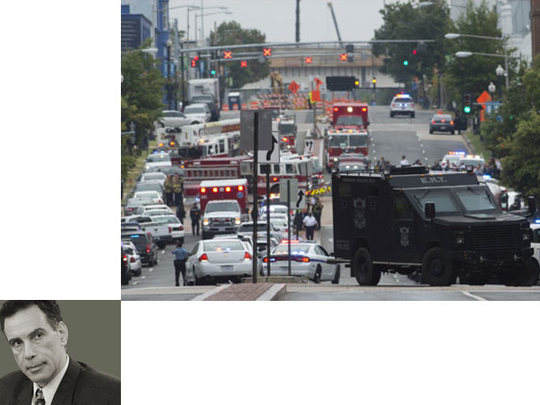
As former US president Ronald Reagan would say, “Here we go again.” Another mass shooting, this time at the Navy Yard in the nation’s capital, Washington D.C. and another virtually unproductive debate over gun control.
Two considerations are likely to ensure that the debate, if it ever gets under way in Congress, will be marked by sterility and lack of political courage. First, if the horrific tragedy last December of the shooting at Sandy Hook elementary school in Connecticut, which killed 20 children and six teachers, failed to convince American legislators of the necessity for tougher gun control laws, the shooting at the Navy Yard, tragic as it may be, is less likely to move American legislators to action.
The second consideration relates to the fact that a week before the Washington shooting, the voters recalled two Colorado legislators for daring to support tougher gun control laws. This illustrates both the attachment some Americans have for the Second Amendment that grants them the right to bear arms and the swift punishment they, and their powerful political organisation — the American Rifle Association — are able to mete out to politicians, who do not protect their interests.
This raises some questions about the nature of American democracy. If democracy is broadly defined as government by the people, for the people, then what about the salient feature of the American political system: The unusual power enjoyed by lobbies in setting the legislative agenda?
It seems that American legislators, and politicians in general, are much more sensitive to the pressure of interest groups and lobbies than to public opinion. Consider how a majority of Americans support Palestinian rights, including an independent state; yet Congress consistently votes along the political line prescribed by the powerful Israeli lobby.
Or consider how a majority of Americans are in favour of tougher gun control laws, yet neither Congress nor the president can change that reality. All Barack Obama’s spokesman Jay Carney says is, “the president supports, as do an overwhelming majority of Americans, common-sense measures to reduce gun violence”.
It follows from the above that the democratic principle of government — by the people, for the people — is missing. What we have here, as is evident from the power of the Israeli lobby or the gun lobby, is government by the representatives of the people, not for the people, but for interest groups.
Of course, this does not mean that America is not a democracy; it is a democracy, but like all democracies, it is an imperfect democracy. Nonetheless, the door is open to the people to organise and use their right to petition their government and influence the legislative and political agenda.
This also suggests that in its march towards a more perfect union, and a more just society, American democracy should be realistic in perspective, humble in its preaching, and critical in its self-examination. If we place all these considerations within the present debate of gun control, it will become apparent that the larger debate is inescapably that of a culture rooted in violence and its glorification.
From the early days of colonising of the Americas, the first settlers imposed their authority by force of arms and eliminated the competing indigenous culture. Similarly, the end of Spanish colonialism saw the emergence of American imperial ambitions marked by blood and fire in the Philippines. After the Second World War, only the nuclear deterrence of the Soviet Union deterred John Foster Dulles and the Eisenhower administration from liberating eastern Europe from communism, but American military interventions in central America continued. The Korean War was followed by gradual support for French war in Indochina, and full-fledged war in Vietnam.
Strategic interests in the Middle East led to military ventures in Lebanon, the first Gulf War in 1991, the war in Afghanistan, and the invasion of Iraq in 2003.
The militarisation of American foreign policy is supported by a huge military industrial complex whose power and interests span the globe. Suffice to say that the US is the largest exporter of weapons in the world and, alone, accounts for three-quarters of the world’s arms trade.
Violence pervades the popular culture. Hollywood continues to be the world centre of violent entertainment. There are hardly any practical examples of the alternative to violence as a conflict resolution model — outside academic accounts in curricular materials. Even the television productions of cartoons offer no alternative to violence to settle disputes. My three-year-old nephew finds it hilarious to pull his father’s nose with one hand and hit him on the forehead with the clenched fist of his other hand, courtesy Tom And Jerry.
There are reportedly 300 million firearms privately owned in the US; and 84 people are killed every single day with guns.
According to the Children’s Defence Fund, since 1979, gun violence has been responsible for the deaths of 119,079 children in America. This is more than the American lives lost in the First World War (53,402), Vietnam (47,434) and the Iraq war (3,517) combined.
Senator Dianne Feinstein, a leading democrat and advocate of gun control legislation, in lamenting the Navy Yard shooting, mourned “the litany of massacres” the country has suffered, and asked “when will enough be enough?”
Adel Safty is distinguished visiting professor and special adviser to the rector at the Siberian Academy of Public Administration, Russia. His book, Might Over Right, is endorsed by Noam Chomsky and published in England by Garnet, 2009.










